UNITAR Organizes Briefing on General Assembly and Main Committees
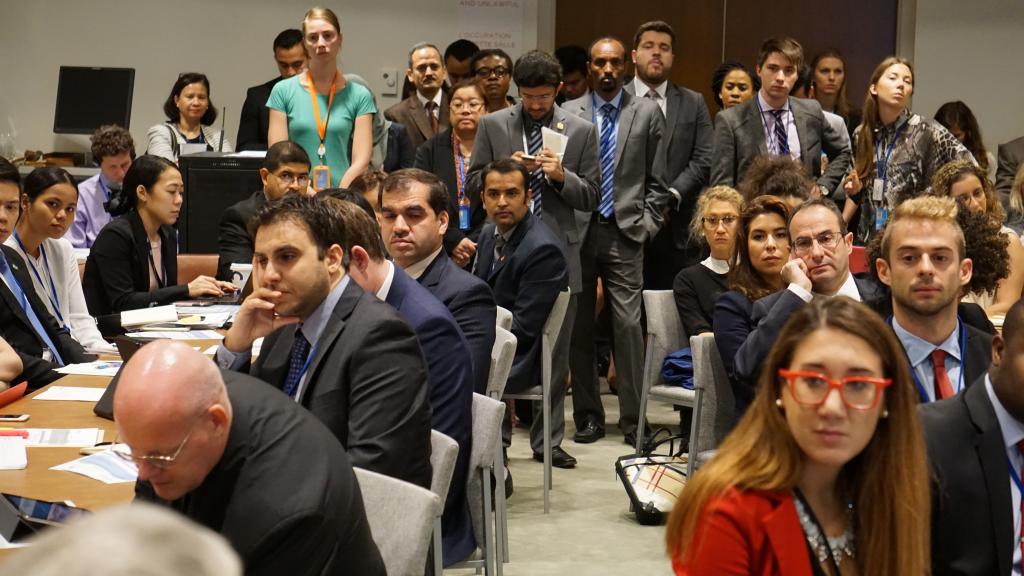 29-30 September 2016, New York, USA- The United Nations Institute for Training and Research (UNITAR), in partnership with the Permanent Mission of Italy to the United Nations, organized a two-day course entitled, “A Special Briefing on the Work of the General Assembly and the Main Committees”. The event was widely attended by 125 delegates. The briefing was opened by Mr. Marco A. Suazo, Head of Office, UNITAR New York. Mr. Suazo welcomed the delegates to the briefing and provided an overview of the topics at hand. He then welcomed H.E. Mr. Inigo Lambertini, the Deputy Permanent Representative of Italy to the United Nations and thanked him for Italy’s support for a series of courses being organized by UNITAR in partnership with the Permanent Mission of Italy to the United Nations. Then Mr. Lambertini thanked UNITAR for their work and expressed his excitement in the series of courses being launched. The first session was then opened.
29-30 September 2016, New York, USA- The United Nations Institute for Training and Research (UNITAR), in partnership with the Permanent Mission of Italy to the United Nations, organized a two-day course entitled, “A Special Briefing on the Work of the General Assembly and the Main Committees”. The event was widely attended by 125 delegates. The briefing was opened by Mr. Marco A. Suazo, Head of Office, UNITAR New York. Mr. Suazo welcomed the delegates to the briefing and provided an overview of the topics at hand. He then welcomed H.E. Mr. Inigo Lambertini, the Deputy Permanent Representative of Italy to the United Nations and thanked him for Italy’s support for a series of courses being organized by UNITAR in partnership with the Permanent Mission of Italy to the United Nations. Then Mr. Lambertini thanked UNITAR for their work and expressed his excitement in the series of courses being launched. The first session was then opened.
Day 1:
The first session of the first day covered the UN Charter and general trends of the work of the General Assembly. The first to speak was Mr. Larry Johnson, Adjunct professor of Law at Columbia Law School and the former Assistant-Secretary General for Legal Affairs at the United Nations. Mr. Johnson began the discussion by outlining the roles and duties of the General Assembly as mandated by the United Nations Charter. He also discussed how some of these Articles of the Charter have shifted in interpretation through the years and what practical implications that would have on the work of the General Assembly. He then turned the floor to Ms. Maria Maldonado, the Former Director of General Assembly Affairs Branch (GAAB). She began by outlining the agenda of the General Assembly, and then spoke about the roles and responsibilities of the President of the General Assembly. The next to speak was Mr. Kenji Nakano, Chief of the General Assembly Affairs Branch (GAAB). He continued to speak about the roles and responsibilities of the President of the General Assembly and how the role has changed throughout the years. Mr. Marco 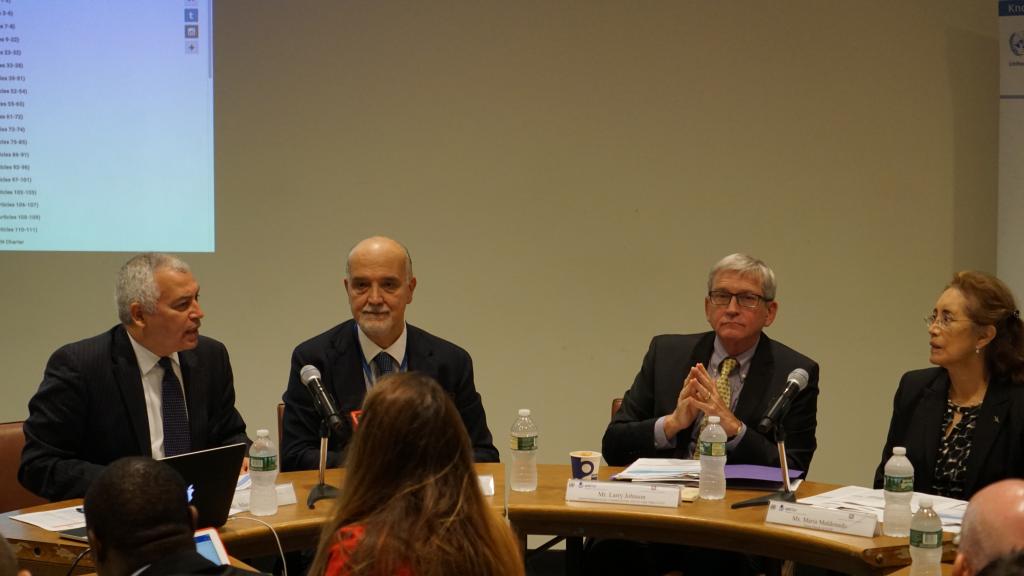 Suazo, thanked the panelists for their comments and then requested that they speak more to the topics of special sessions, plenary sessions, as well as the election of the President of the General Assembly. The first to address these topics was the Mr. Nakano, who outlined the process of voting for the President of the General Assembly. Mr. Johnson also outlined further the roles of the President of the General Assembly. Mr. Marco Suazo thanked the panellists and then welcomed the panelist of the second session.
Suazo, thanked the panelists for their comments and then requested that they speak more to the topics of special sessions, plenary sessions, as well as the election of the President of the General Assembly. The first to address these topics was the Mr. Nakano, who outlined the process of voting for the President of the General Assembly. Mr. Johnson also outlined further the roles of the President of the General Assembly. Mr. Marco Suazo thanked the panellists and then welcomed the panelist of the second session.
In the second session of the first day, the discussion on rules of procedure of the General Assembly was led by Mr. Ziad Mahmassani, Political Affairs Officer, General Assembly Affairs Branch. Mr. Mahmassani outlined the rules and procedures of the General Assembly, such as credentials, special and emergency sessions, voting, motions and co-sponsorship. The floor was then opened up the questions in which Mr. Nakano and Mr. Johnson provided insight into the practical implications for motions and points of order.
The third session of the first day was led by Mr. Kenji Nakano and discussed the 71st session of the General Assembly. Mr. Nakano outlined the main themes and topics to be addressed, as well as where to find pertinent documents to the agenda of the General Assembly. He also mentioned the important upcoming elections of different councils as well as the dates of the committees. After the panel was opened for questions, the session ended and the briefing was ended for lunch.
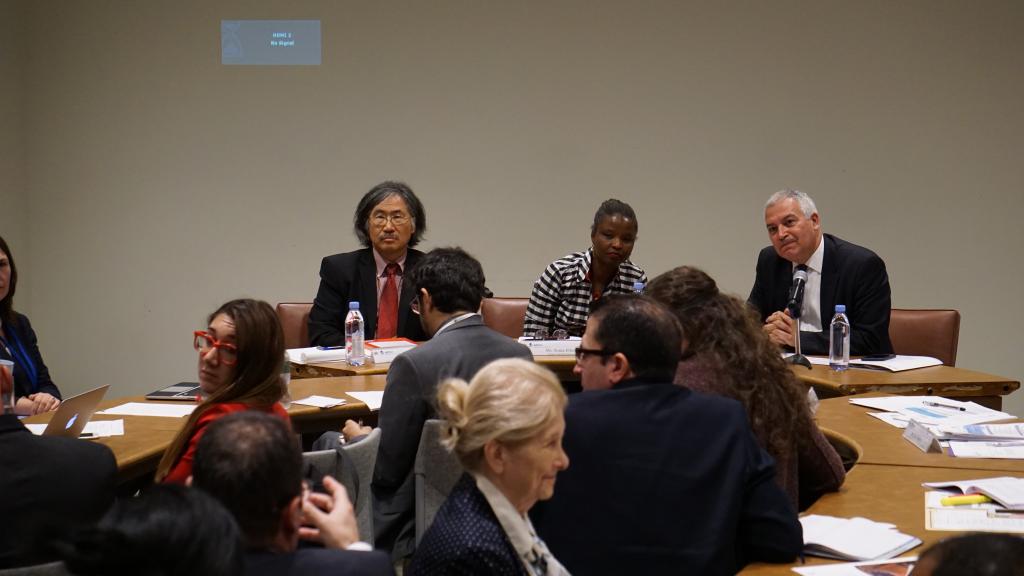 In the afternoon of the first day, the sessions covered the work of the First, Second and Third Committee. The fourth session of the day covered the work of the First Session (Disarmament and International Security) and was led by Ms. Sonia Elliott, Secretary of the First Committee and Mr. Tsutomu “Tom” Kono, Focal Point for the First Committee, Office for Disarmament Affairs. Ms. Elliott initiated the discussion by outlining the administrative aspects of the committee such as the current chair (which is the Permanent Representative of Algeria to the United Nations), meetings and the agenda of the committee. She also outlined the topics of discussion for the First Committee. Next to speak was Mr. Kono. He covered topics pertaining to disarmament such as non-proliferation, peaceful use of resources and land mines. He also spoke about the relationship between the First Committee and the Fourth Committee (Special Political and Decolonization). The panel was opened to questions and was then closed.
In the afternoon of the first day, the sessions covered the work of the First, Second and Third Committee. The fourth session of the day covered the work of the First Session (Disarmament and International Security) and was led by Ms. Sonia Elliott, Secretary of the First Committee and Mr. Tsutomu “Tom” Kono, Focal Point for the First Committee, Office for Disarmament Affairs. Ms. Elliott initiated the discussion by outlining the administrative aspects of the committee such as the current chair (which is the Permanent Representative of Algeria to the United Nations), meetings and the agenda of the committee. She also outlined the topics of discussion for the First Committee. Next to speak was Mr. Kono. He covered topics pertaining to disarmament such as non-proliferation, peaceful use of resources and land mines. He also spoke about the relationship between the First Committee and the Fourth Committee (Special Political and Decolonization). The panel was opened to questions and was then closed.
The fifth session of the day covered topics of the Second Committee (Economic and Financial). The discussion was led by Ms. Emer Herity, Secretary of the Second Committee and Chief of ECOSOC Affaires Branch. Ms. Herity covered the administrational details of the committee such as dates, agenda and procedural measures. Ms. Herity also outlined the process for submitting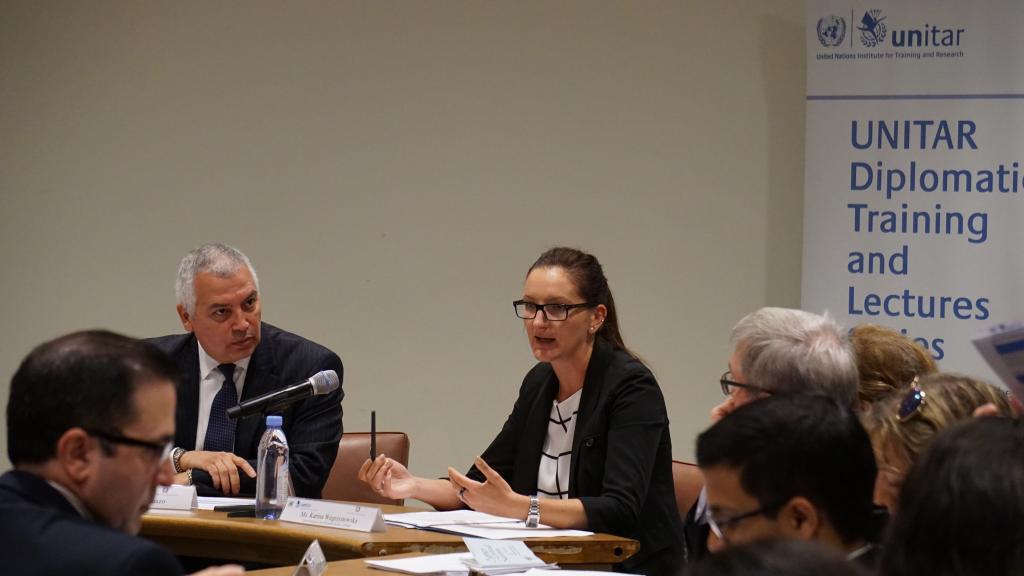 resolutions. The floor was then opened up to questions.
resolutions. The floor was then opened up to questions.
The sixth and final session of the first was covered the work of the Third Committee (Social, Humanitarian and Cultural) and was led by Ms. Karina Wegrzynowska, Vice-Chair of the Third Committee. Ms. Wegrzynowska outlined the wide array of topics that could be discussed in the Third Committee and highlighted the importance and centrality of human rights. After the panel was opened for questions, Mr. Marco A. Suazo thanked the participants for attending and invited all to join for the sessions continuing on day two of the briefing.
Day 2:
The morning was opened by Mr. Marco A. Suazo as he welcomed delegates to the second day of the two-day briefing. After highlighting the importance of the topics of discussion for the day, he opened the first session.
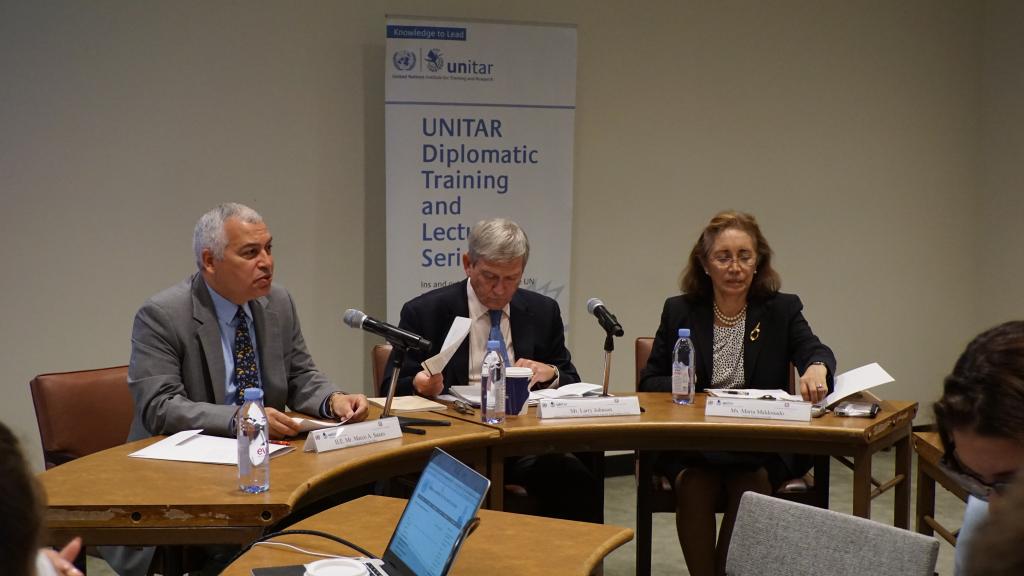 The first session of the second day covered negotiation and decision making in the General Assembly and was again led by Mr. Larry Johnson and Ms. Maria Maldonado. The two panels outlined were the relationship between the General Assembly and the Security Council, discussing the rules and duties of both. He then discussed the process of submitting a resolution, as well as budgeting, sponsors and amendments. He also outlined how the rules of voting and negotiation discussed in Session 2 of the First day had practical implications for furthering one’s own resolution. After the panel was opened to questions, the session was closed.
The first session of the second day covered negotiation and decision making in the General Assembly and was again led by Mr. Larry Johnson and Ms. Maria Maldonado. The two panels outlined were the relationship between the General Assembly and the Security Council, discussing the rules and duties of both. He then discussed the process of submitting a resolution, as well as budgeting, sponsors and amendments. He also outlined how the rules of voting and negotiation discussed in Session 2 of the First day had practical implications for furthering one’s own resolution. After the panel was opened to questions, the session was closed.
The second session of the second day was discussed conference services, meeting management and documentation. The first to speak was Ms. Meena Sur, Chief of Documents Control Unit. Ms. Sur discussed the process for submitting documents. She highlighted important tools to access documents as well as the pertinent information needed for acquiring translation of documents. The next to speak was Ms. Mika Murakami, Deputy Chief of Meetings Managements Section, Department for General Assembly and Conference Management. Ms. Murakami shared important details pertaining to EMeets, the UN Journal and interpretation services. She discussed the purposes of these tools and then turned the discussion over to her colleague, Mr. Karl Manalili. He discussed the process for requesting meetings such as procuring a room, getting Audio/Visual services as well as requesting translation services. The panel was opened to questions and then was closed.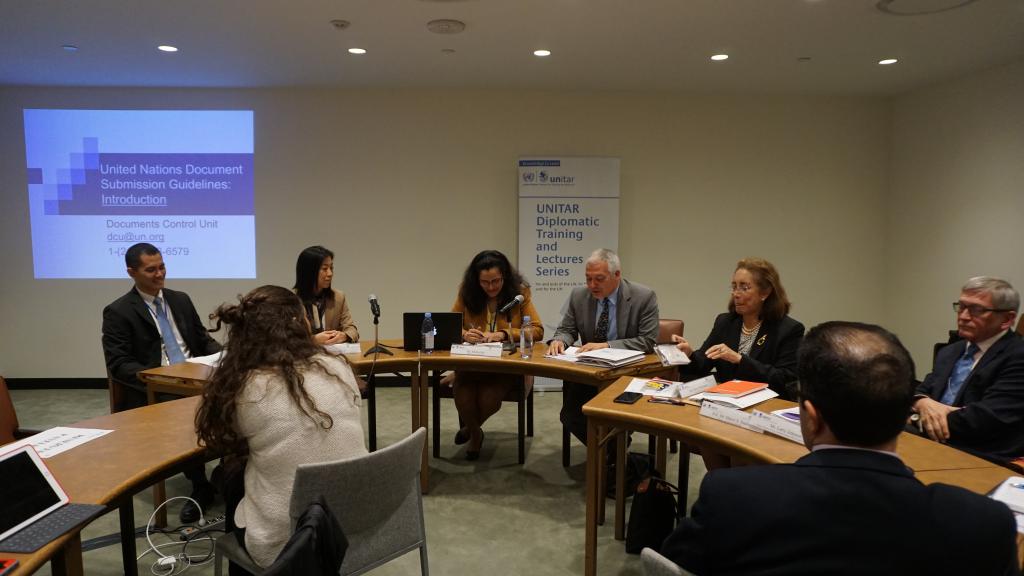
As the second day continued, the third session covered documents research and the Dag Hammarskjold Library. The first speaker was Ms. Ramona Kohrs, Coordinator of Outreach to Member States, Dag Hammarskjold Library. Ms. Kohrs opened the panel by going into a brief history of the Dag Hammarskjold Library. She then discussed the how to request services as well as the many different tools that the library has to offer. The next to speak was Ms. Susan Gourd, Training Coordinator, Dag Hammarskjold Library. Ms. Gourd discussed the various resources that were available when researching documents at the United Nations. She showed delegates how to navigate search engines such as ODS, ONBISnet and AskDag. The last to speak during the session was Ms. Lisa Orrenius, Director of the New York Office, Dag Hammarskjold Foundation. She spoke about the work of the Dag Hammaskjold Foundation and highlighted the ways the foundation was supporting delegates and staff of the United Nations. The panel was opened to questions and then the briefing was adjourned for lunch.
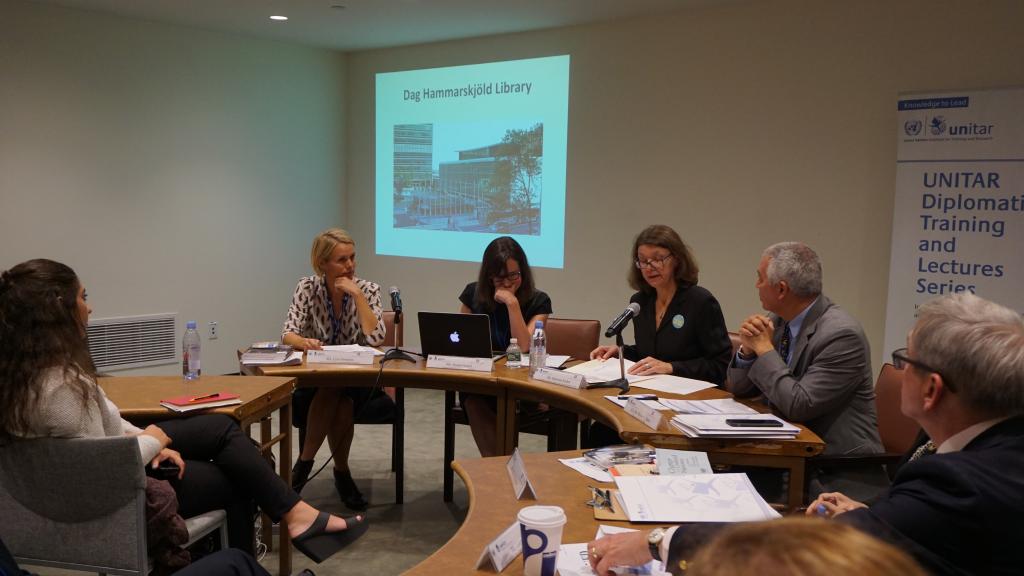 In the afternoon of the second day, the session continued on the work of the committees. The fourth session of the second day covered the work of the Fourth Committee (Special Political and Decolonization). The session was opened by H.E. Mr. Vladimir Drobnjak, Permanent Representative of the Republic of Croatia to the United Nations. Ambassador Drobnjak gave an overview of the topics that were covered in the Fourth Committee such as decolonization, Palestine, refugees and peacekeeping. He also spoke about the non-self-governing territories and which would be discussed in the upcoming session. The next to speak was Ms. Christa Giles, Secretary of the Fourth Committee. Ms. Giles addressed the more administrative aspects of the committee such as the calendar and schedule, as well as information on voting.
In the afternoon of the second day, the session continued on the work of the committees. The fourth session of the second day covered the work of the Fourth Committee (Special Political and Decolonization). The session was opened by H.E. Mr. Vladimir Drobnjak, Permanent Representative of the Republic of Croatia to the United Nations. Ambassador Drobnjak gave an overview of the topics that were covered in the Fourth Committee such as decolonization, Palestine, refugees and peacekeeping. He also spoke about the non-self-governing territories and which would be discussed in the upcoming session. The next to speak was Ms. Christa Giles, Secretary of the Fourth Committee. Ms. Giles addressed the more administrative aspects of the committee such as the calendar and schedule, as well as information on voting.
The fifth session of the say covered the work of the Sixth Committee (Legal). The panelist was Ms. Arnold Pronto, Principal Legal Officer. He outlined the overall processes of the Sixth Committee, as well as highlighting some of the unique issues that the Sixth Committee discusses. He also discussed the duties of the Committee relating to permanent observer status.
The sixth and final session of the day discussed the relationship between ECOSOC and the General Assembly. The discussion was led by Mr. Neil Pierre, Chief, Policy Coordination Branch, Office for ECOSOC Support and Coordination in UN-DESA. Mr. Pierre began by discussing the roles of ECOSOC within the UN system as well as its mechanisms. He then looks at the relevant resolutions that outlined the relationship and coordination between ECOSOC and the General Assembly.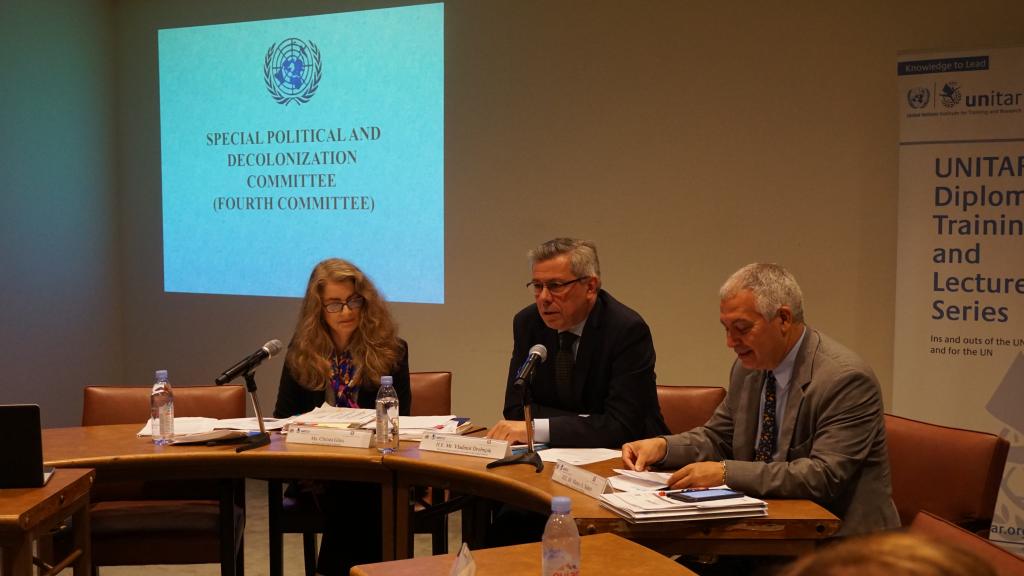
After the closing of the final session, Mr. Marco Suazo thanked all the delegates for attending. He again thanked Italy for their continued support, as well as his own staff. He encouraged the participants to attend future UNITAR events and then closed the briefing.
Photo Credit: UNITAR

